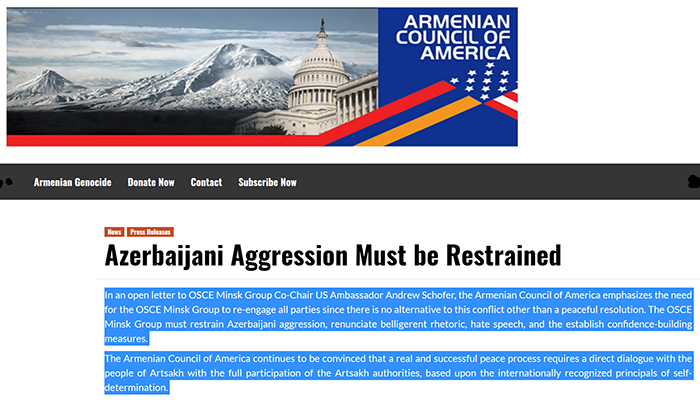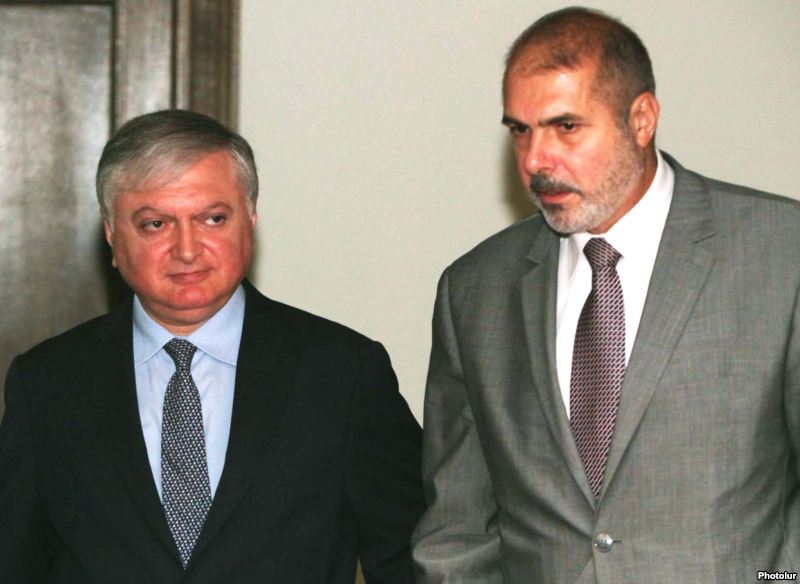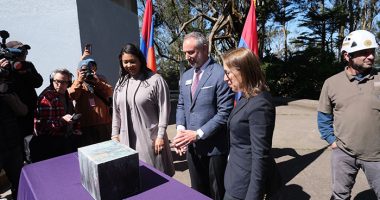In an open letter to OSCE Minsk Group Co-Chair US Ambassador Andrew Schofer, the Armenian Council of America emphasizes the need for the OSCE Minsk Group to re-engage all parties since there is no alternative to this conflict other than a peaceful resolution. The OSCE Minsk Group must restrain Azerbaijani aggression, renunciate belligerent rhetoric, hate speech, and the establish confidence-building measures.
The Armenian Council of America continues to be convinced that a real and successful peace process requires a direct dialogue with the people of Artsakh with the full participation of the Artsakh authorities, based upon the internationally recognized principals of self-determination.
The text of the open letter is bellow:
Mr. Ambassador Andrew Schofer
OSCE Minsk Group Co-Chair
United States Department of State
2201 C Street Northwest
Washington D.C. 20520
Dear Mr. Ambassador,
Your mandate is very clear: to provide an appropriate framework for conflict resolution in the way of assuring the negotiation process; to obtain conclusion by the Parties of an agreement on the cessation and permanent resolution of the Nagorno-Karabakh (Artsakh) conflict. The Nagorno-Karabakh conflict reignited last year due to the warmongering aggression of the Azerbaijani leadership, thousands of young men have perished, and Russian troops stand where OSCE peacekeepers theoretically should.
The Republic of Armenia acted in accordance with the terms of the 2020 ceasefire agreement while Azerbaijan has continuously and maliciously violated them.
The following are the current statuses of each term of the ceasefire:
- A complete ceasefire and termination of all hostilities in the area of the Nagorno-Karabakh conflict is declared starting 12:00 am (midnight) Moscow time on November 10, 2020. The Republic of Azerbaijan and the Republic of Armenia, hereinafter referred to as the “Parties,” shall stop in their current positions. Azerbaijan did not stop in its position but took 60 Armenians as POWs in Hadrut. Azerbaijan has expanded their hostilities by encroaching upon Armenia’s sovereign territory and intentionally setting fire to vast swathes of Armenia’s land.
- The Agdam District shall be returned to the Republic of Azerbaijan by November 20, 2020. Armenia has fulfilled this expectation.
- The peacemaking forces of the Russian Federation, namely, 1,960 troops armed with firearms, 90 armoured vehicles and 380 motor vehicles and units of special equipment, shall be deployed along the contact line in Nagorno-Karabakh and along the Lachin Corridor. Russia has fulfilled this expectation.
- The peacemaking forces of the Russian Federation shall be deployed concurrently with the withdrawal of the Armenian troops. The peacemaking forces of the Russian Federation will be deployed for five years, a term to be automatically extended for subsequent five-year terms unless either Party notifies about its intention to terminate this clause six months before the expiration of the current term. Russia has fulfilled this expectation.
- For more efficient monitoring of the Parties’ fulfilment of the agreements, a peacemaking centre shall be established to oversee the ceasefire. Russia has fulfilled this expectation.
- The Republic of Armenia shall return the Kalbajar District to the Republic of Azerbaijan by November 15, 2020, and the Lachin District by December 1, 2020. The Lachin Corridor (5 km wide), which will provide a connection between Nagorno-Karabakh and Armenia while not passing through the territory of Shusha, shall remain under the control of the Russian Federation peacemaking forces. Armenia has fulfilled this expectation.
As agreed by the Parties, within the next three years, a plan will be outlined for the construction of a new route via the Lachin Corridor, to provide a connection between Nagorno-Karabakh and Armenia, and the Russian peacemaking forces shall be subsequently relocated to protect the route. This is under consideration by the parties.
The Republic of Azerbaijan shall guarantee the security of persons, vehicles and cargo moving along the Lachin Corridor in both directions. Azerbaijan took civilian hostages within the Lachin Corridor post ceasefire and is currently utilizing them as bargaining chips for its agenda.
- Internally displaced persons and refugees shall return to the territory of Nagorno-Karabakh and adjacent areas under the supervision of the United Nations High Commissioner for Refugees. Azerbaijan does not guarantee the safety of indigenous Armenians wanting to return to their homes in occupied Artsakh, and has demolished and desecrated their homes, churches, and monuments of cultural significance.
- The Parties shall exchange prisoners of war, hostages and other detained persons, and dead bodies. Armenia has fulfilled this expectation. Azerbaijan has tortured and held hostage hundreds of Armenian POWs for over 8 months in violation of the Geneva Convention and this ceasefire agreement. Azerbaijan has killed 19 of these POWs, including four women, and has illegally sentenced POWs through sham trials.
- All economic and transport connections in the region shall be unblocked. The Republic of Armenia shall guarantee the security of transport connections between the western regions of the Republic of Azerbaijan and the Nakhchivan Autonomous Republic in order to arrange unobstructed movement of persons, vehicles and cargo in both directions. The Border Guard Service of the Russian Federal Security Service shall be responsible for overseeing the transport connections. This is under consideration by the parties. Azerbaijan has encroached upon sovereign Armenian territory and on occasion harassed and obstructed Armenian civilians from utilizing the major highway between the Armenian cities of Goris and Kapan.
As agreed by the Parties, new transport links shall be built to connect the Nakhchivan Autonomous Republic and the western regions of Azerbaijan. This is under consideration by the parties.
The Armenian Council of America believes that there is no alternative to this conflict other than a peaceful resolution. Azerbaijani aggression must be restrained, the renunciation of belligerent rhetoric, hate speech, and the establishment of confidence-building measures is needed. The Armenian Council of America continues to be convinced that a real and successful peace process requires a direct dialogue with the people of Artsakh with the full participation of the Artsakh authorities, based upon the internationally recognized principals of self-determination.
Armenian Council of America










